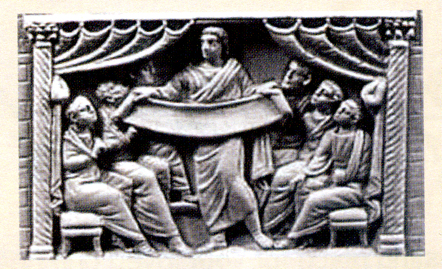When reading commentaries or books addressing social issues confronting Christianity and the church, one often encounters discussions about the historical contexts of biblical passages. This information is occasionally referred to as a specific passage’s “backstory.” It is often claimed that these backstories are essential for correctly understanding the Bible. Discovering additional relevant historical data can be beneficial when seeking to understand a biblical text, while at other times is can lead to wild speculations. Usually if a backstory is going to be of real value, then the biblical author usually provides ancillary details alluding to it within the passage (e.g., Mark 7.3-4; the maniacal practices of Pharisees concerning ritual cleansings). However, there are times in which extra-biblical research is necessary in order to discover valuable insight concerning the backstory of a biblical text. An example would be the concept of Jewish “betrothal” in Matthew 1.18-19. That Joseph might break up with Mary upon learning of her pregnancy before they were “married” would not be hard to understand for modern audiences. Of course he would break up with her! However, in first-century Judaism there were significant moral, social, legal, and financial issues at stake. The situation was not the equivalent of a modern day breakup. Joseph and Mary’s situation was equivalent to a divorce, but there again confusion often arises for modern audiences. How can there be a divorce if a couple is not actually married or has not consummated their marriage? Consequently, research into the backstory regarding Jewish betrothal customs is necessary for a precise understanding about this event as found in Matthew’s Gospel.
Another example is Mark 3.6, in which the Pharisees began plotting “with the Herodians” concerning how to kill Jesus. If one simply assumes that the Pharisees got together with another like-minded group for the purposes of destroying Jesus and his ministry, then they would be mislead. The reality is that the Pharisees and Herodians were theological and political opposites. The Pharisees were spiritually minded religious conservatives that were looking for the Messiah that would be of pure Jewish ethnicity and a direct descendent of King David. The Herodians, on the other hand, were Jewish leaders that were the functional equivalent of Greek secularists that were happy for Judah to be ruled by Herodian Dynasty, which originated with Herod the Great. Herod the Great was Edomite by his father and Jewish through his mother. To put it bluntly, the Pharisees viewed the Herodians as a leprous blight on the purity of Judean rulers. The Herodians were not real Jews in their opinion because they did not live like them or believe in their brand of Judaism. Nevertheless, Mark documents that early in his ministry the Pharisees felt so threatened by Jesus that they ignored their differences with the Herodians in order to create an alliance with them. These are a few examples in which knowing relevant historical data can provide greater insight into a passage’s backstory and thus a better understanding of it.
Regrettably, however, there are many other examples in which people “invent” backstories to justify their erroneous interpretations of specific biblical passages. One example is that the apostle Paul was too bound to his “patriarchal culture and worldview”; consequently, he could not imagine women serving as elders in local churches. Or that he had pedophilia or temple prostitution in mind as he wrote about biblical prohibitions concerning homosexual behavior in Romans 1.26-28. Consequently, he would never prohibit monogamous marriages between loving gay couples. In cases such as these, people create incongruent backstories that are based solely upon what they believe was in the mind of the biblical author. In other cases, they create possible scenarios that a biblical text provides no allusion to in order to support their contradictory interpretations. Regrettably, anyone can invent a “backstory” that in their mind justifies their interpretation of a biblical text.
However, the essential question is whether or not a biblical text provides any details that require further investigation into its “backstory.” That being said, the reality is that if a biblical author provided no historical clues with respect to what he wrote, then whatever backstory that one might create has little value for correctly interpreting what has been written. Again, using the passages from Matthew and Mark as examples, even if one is confused about Joseph and Mary’s marital status, one can still understand the meaning of the text; specifically, that Joseph and Mary were somehow viewed as married even though they had not consummated their union until after Jesus’ birth. Similarly, in Mark one learns that the Pharisees began recruiting others for the purposes of assassinating Jesus. That they recruited political opposites only reveals their desperation; nevertheless, it does not change the reality that the Pharisees went on the offensive and began recruiting others in order to form a politically powerful alliance against the Jesus. The bottom line is that one should be mindful that backstories are only relevant if they are based upon historical data actually contained in the biblical text. Generally speaking, relevant information will be found in what the biblical author wrote, while at other times it may be found in what other authors wrote (e.g., Luke’s parable of the “Good Samaritan” and John’s explanation that “Jews had no dealings with Samaritans”; Jn 4.9). In short, we should always rely solely upon the information provided by a biblical author to guide our exposition and application of the scriptures. And we must always reject contrived backstories invented by others for the purpose of undermining what a biblical passage clearly teaches.
Copyright @ 2023 Monte Shanks








 Skeptics often enjoy comparing the canonical Gospels in an attempt to make a lot of noise about what they perceived as errors, inaccuracies, and inconsistencies contained in them. And as we read their works it often causes us to wrestle with these differences, and more specifically the perceived differences between the Synoptic Gospels and the Gospel of John. Some suggest that the major differences that exist between John’s Gospel and the Synoptics are because the Synoptics focused more on the historical events of Jesus’ life, while John was more theologically minded. While this may be true to some degree, a closer look at all of the Gospels reveals that they all are concerned with both historical details and theological instruction with respect to Jesus’ life. For example, there are approximately 18 parables of Jesus that are unique to Luke’s Gospel, and since parables were a primary method of theological instruction for Jesus then one should concluded that theological content was a major emphasis of Luke. Similarly, the Gospel of Matthew contains 5 major discourses of Jesus, some material being unique to Matthew; consequently, no one can conclude that theological instruction was not also a significant focus for Matthew. Likewise, a major emphasis in Mark’s Gospel is Jesus’ authority over the demonic realm, so how can anyone report on this topic without emphasizing the reality of the God and the spiritual realm without focusing on “theological” content and issues? Conversely, the Gospel of John is systemic with unique historical details about Jesus’ life, his ministry, and his trial; so much so that to enumerate them all would take considerable time—so how could anyone suggest that historical accuracy was not one of his major concerns? John himself stated that “This is the disciple who is testifying to these things and wrote these things, and we know that his testimony is true. And there are also many other things which Jesus did, which if they were written in detail, I suppose that even the world itself would not contain the books that would be written” (Jn 21.24-25). Notice John’s emphasis, he claimed that truth about what Jesus “did” was an absolute component of his Gospel; thus his Gospel was not only concerned with what Jesus taught (theological truth) but with the things that Jesus actually accomplished (historical accuracy). He even admitted that it would not be possible to account for all the amazing historical events that occurred in the life of Jesus within a single volume. Consequently, one can no more argue that historical accuracy was not a major emphasis in John’s Gospel than they can argue that theology was not a major theme in the Synoptic Gospels.
Skeptics often enjoy comparing the canonical Gospels in an attempt to make a lot of noise about what they perceived as errors, inaccuracies, and inconsistencies contained in them. And as we read their works it often causes us to wrestle with these differences, and more specifically the perceived differences between the Synoptic Gospels and the Gospel of John. Some suggest that the major differences that exist between John’s Gospel and the Synoptics are because the Synoptics focused more on the historical events of Jesus’ life, while John was more theologically minded. While this may be true to some degree, a closer look at all of the Gospels reveals that they all are concerned with both historical details and theological instruction with respect to Jesus’ life. For example, there are approximately 18 parables of Jesus that are unique to Luke’s Gospel, and since parables were a primary method of theological instruction for Jesus then one should concluded that theological content was a major emphasis of Luke. Similarly, the Gospel of Matthew contains 5 major discourses of Jesus, some material being unique to Matthew; consequently, no one can conclude that theological instruction was not also a significant focus for Matthew. Likewise, a major emphasis in Mark’s Gospel is Jesus’ authority over the demonic realm, so how can anyone report on this topic without emphasizing the reality of the God and the spiritual realm without focusing on “theological” content and issues? Conversely, the Gospel of John is systemic with unique historical details about Jesus’ life, his ministry, and his trial; so much so that to enumerate them all would take considerable time—so how could anyone suggest that historical accuracy was not one of his major concerns? John himself stated that “This is the disciple who is testifying to these things and wrote these things, and we know that his testimony is true. And there are also many other things which Jesus did, which if they were written in detail, I suppose that even the world itself would not contain the books that would be written” (Jn 21.24-25). Notice John’s emphasis, he claimed that truth about what Jesus “did” was an absolute component of his Gospel; thus his Gospel was not only concerned with what Jesus taught (theological truth) but with the things that Jesus actually accomplished (historical accuracy). He even admitted that it would not be possible to account for all the amazing historical events that occurred in the life of Jesus within a single volume. Consequently, one can no more argue that historical accuracy was not a major emphasis in John’s Gospel than they can argue that theology was not a major theme in the Synoptic Gospels.
